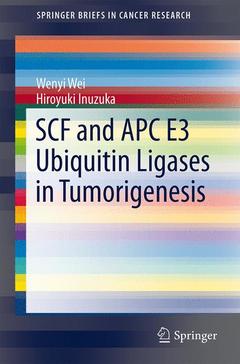Description
SCF and APC E3 Ubiquitin Ligases in Tumorigenesis, 2014
SpringerBriefs in Cancer Research Series
Authors: Inuzuka Hiroyuki, Wei Wenyi
Language: English
Subject for SCF and APC E3 Ubiquitin Ligases in Tumorigenesis:
118 p. · 15.5x23.5 cm · Paperback
Description
/li>Contents
/li>Biography
/li>Comment
/li>
Includes updated profiles of SCF and APC cellular functions and their characterized ubiquitin substrates
Introduces the emergent SCF family members in the human genome and summarizes phenotypes in which the adapter proteins of SCF and APC are manipulated to reflect the pathogenesis of human cancer
Discusses how SCF and APC may represent promising therapeutic targets to treat various types of cancers
Includes supplementary material: sn.pub/extras



